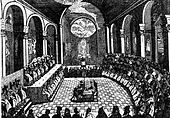Third Council of the Lateran
| Third Council of the Lateran | |
|---|---|
| Date | 1179 |
| Accepted by | |
| Chronological list of ecumenical councils | |
| Part of a series on the |
| Ecumenical councils of the Catholic Church |
|---|
 |
| 4th–5th centuries |
| 6th–9th centuries |
| 12th–14th centuries |
| 15th–16th centuries |
| 19th–20th centuries |
|
Catholicism portal |
The Third Council of the Lateran met in Rome in March 1179. Pope Alexander III presided and 302 bishops attended. The Catholic Church regards it as the eleventh ecumenical council.
By agreement reached at the
Callistus III
(1168–1178). Eventually, at the Peace of Venice, when Alexander gained victory, he promised Frederick that he would summon an ecumenical council.
Besides removing the remains of the recent
were promulgated.The most important of these were:
- Canon 1. In order to prevent the possibility of future schisms, only cardinals were to possess the right to elect a pope. In addition a two-thirds majority was to be required in order for the election to be valid. If any candidate should declare himself pope without receiving the required majority, he and his supporters were to be excommunicated.
- Canon 2 declared null and void those Paschal III), and John de Struma (Callixtus III).
- Canon 3 forbade the promotion of anyone to a parish before the age of 25 and to the episcopate before the age of 30.
- Canon 5 forbade the ordination of clerics not provided with any means of proper support.
- Canon 7 forbade the charging of money to conduct burials, bless a marriage or indeed the celebration of any of the sacraments.
- Canon 11 forbade clerics to have women in their houses or to visit the excommunicated.
- Canon 18 required every cathedral church to appoint a master to teach the clerics and the poor scholars of the church; this action helped launch the cathedral schools that later became universities.[4] It also regulated the license to teach (licentia docendi), stating "let no one demand any money for a licence to teach, or under cover of some custom seek anything from teachers, or forbid anyone to teach who is suitable and has sought a licence." Selling the license to teach could prevent the progress of churches.[5]
- Canon 19 declared excommunication for those who tried to tax churches and clergy without the consent of the bishop.
- Canon 23 concerns the proper organisation of accommodation for lepers.
- Canon 25 excommunicated those who engage in usury.
- Canon 26 forbade Jews and Muslims from having Christian servants and states that the evidence of Christians is always to be accepted against Jews.
- Canon 27 stressed the duty of princes to repress heresy and condemned "the Brabantians, Aragonese, Basques, Navarrese, and others who practice such cruelty toward Christians that they respect neither churches nor monasteries, spare neither widows nor orphans, neither age nor sex, but after the manner of pagans, destroy and lay waste everything" (De Brabantionibus et Aragonensibus, Navariis, Bascolis, Coterellis et Triaverdinis, qui tantam in Christianos immanitatem exercent, ut nec ecclesiis, nec monasteriis deferant, non viduis, et pupillis, non senibus, et pueris, nec cuilibet parcant aetati, aut sexui, sed more paganorum omnia perdant, et vastent).[6]
Among the many attendees at the Council was William of Tyre, the famous historian and, at the time, archbishop of Tyre. William was sent by Baldwin IV as the representative of the Kingdom of Jerusalem, and wrote about the journey to the Council in his history.[7] The Kingdom of Hungary was represented by Andrew, Archbishop of Kalocsa.[8]
Archbishop-elect
Footnotes
- ^ J. P. Adams, Conclave, Sede Vacante 1159, retrieved: 2017-03-21.
- ^ "Third Lateran Council, English translation". 5 March 1179.
- ^ Victoria Blud, The Unspeakable, Gender and Sexuality in Medieval Literature, 1000-1400, page 66.
- ^ Nicholas Orme, Medieval Schools, New Haven and London: Yale University Press, 2006.
- ^ "Third Lateran Council – 1179 A.D." Papal Encyclicals. 5 March 1179. Retrieved 9 May 2020.
- ^ Karen Sullivan, Truth and the heretic: crises of knowledge in medieval French literature (University of Chicago Press, 2005) p. 120
- ^ William of Tyre, XXI.26
- ^ * Udvardy, József (1991). A kalocsai érsekek életrajza (1000–1526) [Biographies of Archbishops of Kalocsa, 1000–1526] (in Hungarian). Görres Gesellschaft. p. 75.
- ^ Arnaud Hari (2010), Écrire l'histoire des évêques de Metz au Moyen Âge: les Gesta episcorum de la fin du VIIIe à la fin du XIVe siècle (PhD diss.), Paul Verlaine University – Metz, 2 vols., at vol. 2, pp. 463–465.
- ^ John B. Freed (2016), Frederick Barbarossa: The Prince and the Myth, Yale University Press, pp. 396–397.
Bibliography
- Summerlin, Danica (2019). The Canons of the Third Lateran Council of 1179: Their Origins and Reception. Cambridge University Press. ISBN 978-1-107-14582-5.
